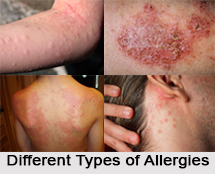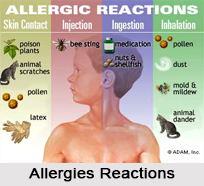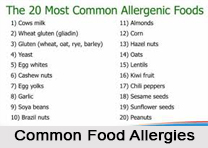 Allergy is basically a disorder of the immune system which happens due to allergens. Allergic reactions may occur within a few minutes of the patient coming in contact with the allergen, or they may be delayed for several hours or even several days. Almost any part of the body can be affected by allergies, but the most common of them are the nose, the eyes, the skin, chest, intestines and ears. Allergies occur due to sensitiveness of the body to a substance, which does not normally affect other persons.
Allergy is basically a disorder of the immune system which happens due to allergens. Allergic reactions may occur within a few minutes of the patient coming in contact with the allergen, or they may be delayed for several hours or even several days. Almost any part of the body can be affected by allergies, but the most common of them are the nose, the eyes, the skin, chest, intestines and ears. Allergies occur due to sensitiveness of the body to a substance, which does not normally affect other persons.
Causes of Allergy
There are innumerable substances in the environment, which can cause mild reactions, ranging from true allergies due to intolerance of certain foods and substances to violent reactions, in many people resulting from pollution.
Classification of Allergy in Ancient India
In ancient India, all forms of antipathy were classified as allergies, and all were caused by an improper activation of the immune system and natural herbs and minerals were believed to be the common treatment for allergies. Much later, it became clear that several different disease mechanisms were mixed up, with the common link to a disordered activation of the immune system. After many researchers in India since decades, allergy was described to be a hyperactive response of the immune system to certain substances, which are "foreign" to the human bodies. These substances are called "allergens", and they can range from food and pollen to dust and drugs. Some of the types of allergies are Food Allergy, Contact allergy, Respiratory Allergy and Insect Sting Allergy.
Symptoms of Allergy
After much research the symptom of allergy has been identified. The symptoms range at a great variety and vary according to the cause of allergy. These include recurring headache, migraine, dizziness, irritability, nervousness, depression, neuralgia, sneezing, conjunctivitis, diabetes, eczema, heart burn, hay fever, indigestion, constipation, diarrhoea, gastric ulcer, asthma, overweight, high blood pressure, chest pain, heart attacks, a stuffy or running nose, shortage of breath, swelling of the face and eyes, etc. The same food can cause different symptoms in different people. Many allergies are multiple and may be caused by multiple allergens.
Stress and Allergy
The chronic stress can aggravate allergic conditions. This has been attributed to a TH2-predominant response driven by suppression of interleukin 12 by both the autonomic nervous system and the hypothalamic-pituitary-adrenal axis. Stress management in highly susceptible individuals may improve symptoms
 Allergic reactions in Human Body
Allergic reactions in Human Body
A wide range of substances and conditions causes allergic reactions. These include pollen, dust, cosmetics and animal hair, poisonous plants, serums, vaccines and drugs, physical agents such as heat, cold and sunlight; as well as a variety of foods. Among the numerous allergens in edibles, the more common ones are oranges, milk, eggs, wheat, fish, chocolates, cabbage, potatoes, tomatoes and strawberries.
Allergy and Human Lifestyle
Allergy is mostly caused by dietetic errors and faulty style of living. For instance, feeding babies are given artificial foodstuff like cereals, meat, corns, whole milk, etc. instead of mother`s milk, before they reach the age of 10 to 12 months. Without proper enzymes needed for the digestion of such food at a very young age, these foods cause allergic reactions.
Causes of Allergy
The important cause of allergy is contemporary processed foods loaded with numerous chemical additives, many of which cause powerful reactions. An allergic condition can result from diet imbalances. There can be a breakdown in the body`s ability to handle sugar due to excessive intake of refined sugar and consequent blood sugar irregularities, or mineral and vitamin imbalances due to defective dietary patterns. Emotional and psychological stress can also lead to allergies. A person through chronic stress can become sensitive to common foods or commonplace substances like petrol fumes.
Remedies of Allergy
The allergies are supposed to be tackled by every person. Hence, first the sources of the allergies must be identified, once the sources are discovered, they should be avoided and lastly, general health and resistance should be built up to establish immunity to them. People can also detect the disturbing foods, naturally, either by the trial-and-error elimination diet and a self-search method. This automatically eliminates many hazards and foods. One should keep away from the inorganic, untreated, unprocessed foods as far as possible.
Diet of avoiding Allergy
The daily diet can be one of the most favourable ways of avoiding allergies. The patient should fast on fresh fruit juices for four or five days. Repeated short juice fasts are likely to result in better tolerance to previous allergies. After the fruit juice fast for about a week the patient can take a mono diet of vegetables or fruits such as carrots, grapes or apples. After that one more food is added to the mono diet. A week later the third food is added and so on. After four weeks, the protein foods can be introduced, one at a time and in case an allergic reaction to a newly introduced food is noticed, it should be discontinued and a new food tried. In this way all real allergens can be eventually eliminated from the diet.
 Foods to Avoid Allergies
Foods to Avoid Allergies
The foods to avoid during allergy are the tea, coffee, chocolate, cola drinks, alcohol, sugar, sweets and foods containing sugar, refined cereals, meats, fish, chicken, tobacco, milk, cheese, butter, smoked, salted, pickled foods and foods containing any chemical additives, preservatives and flavouring. These foods cause either toxic accumulations or over-stimulation of adrenal glands or strain on pancreatic enzyme production or disturb the blood sugar balance.
Allergy and Vitamins
For preventive purposes, the entire C complex vitamins are recommended. They gradually strengthen cell permeability to help immunize the body from various allergies, especially hay fever. Often the addition of pantothenic acid brings great relief to allergy sufferers. Multiple allergies may result from poor adrenal gland functioning. In such cases liberal amounts of pantothenic acids help cure them, although the recovery will take several weeks. An adequate intake of vitamin E is also beneficial, as this vitamin possesses effective anti-allergic properties. The body requires a large alkaline reserve for its daily activity.
Acid Formation during Allergy
There are many emergencies of acid formation through the day from wrong foods; fatigue, mental stress and lack of sleep can be met by the competency of the alkaline reserves. Boosting the normal body reserve of alkaline by liberal use of alkaline-forming foods is essential for those suffering from allergies.
Yoga to Avoid Allergy
Treatment of allergies by Yoga Asanas is also very effective. For allergic conditions in which an element of stress is present, it is essential to employ such methods as relaxation, exercise, meditation and mind control. These methods will reduce or remove stress and thereby contribute towards the treatment of allergies. Yogic asanas like Yogamudra Ardh-Matsyendrasana, Sarvangasana, Shavasana and Anuloma- Viloma, Pranayama are also beneficial. Magnetic Therapy, being one of the treatment methods of allergies, suggests people suffering from allergy should take mixed magnetised water regularly. They should also apply the magnets twice daily for 15 minutes once to the hands in the morning and again to the thighs (about 5 cm above the upper border of the patella on the inner side) with North Pole placed on the right thigh and South Pole on the left. The recommended treatment is suitable for any type of allergy.




















